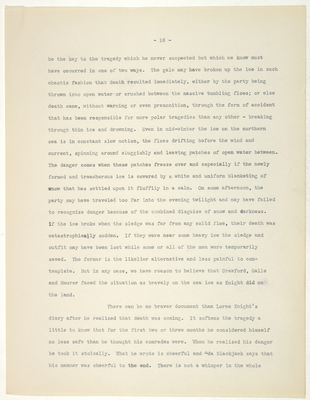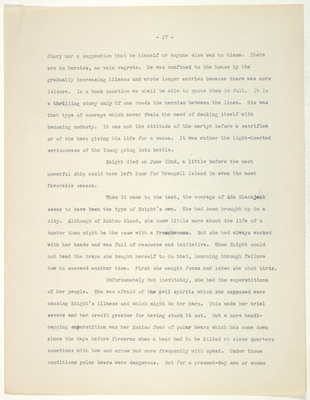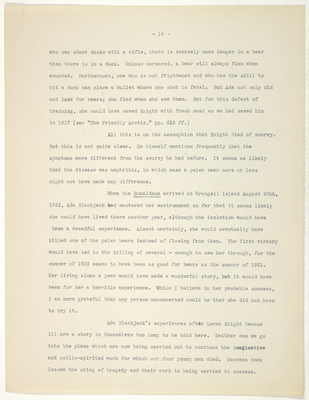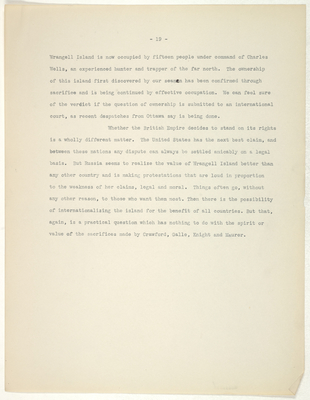Pages
stefansson-wrangel-09-25-008-016
- 16 -
be the key to the tragedy which he never suspected but which we know must have occurred in one of two ways. The gale may have broken up the ice in such chaotic fashion that death resulted immediately, either by the party being thrown into open water or crushed between the massive tumbling floes; or else death came, without warning or even premonition, through the form of accident that has been responsible for more polar tragedies than any other - breaking through thin ice and drowning. Even in mid-winter the ice on the northern sea is in constant slow motion, the floes drifting before the wind and current, spinning around sluggishly and leaving patches of open water between. The danger comes when these patches freeze over and especially if the newly formed and treacherous ice is covered by a white and uniform blanketing of snow that has settled upon it fluffily in a calm. On some afternoon, the party may have traveled too far into the evening twilight and may have failed to recognize danger because of the combined disguise of snow and darkness. If the ice broke when the sledge was far from any solid floe, their death was catastrophically sudden. If they were near some heavy ice the sledge and outfit may have been lost while some or all of the men were temporarily saved. The former is the likelier alternative and less painful to contemplate. But in any case, we have reason to believe that Crawford, Galle and Maurer faced the situation as bravely on the sea ice as Knight did on the land.
There can be no braver document than Lorne Knight's diary after he realized that death was coming. It softens the tragedy a little to know that for the first two or three months he considered himself no less safe than he thought his comrades were. When he realized his danger he took it stoically. What he wrote is cheerful and Ada Blackjack says that his manner was cheerful to the end. There is not a whimper in the whole
stefansson-wrangel-09-25-008-017
- 17 -
diary nor a suggestion that he himself or anyone else was to blame. There are no heroics, no vain regrets. He was confined to the house by the gradually increasing illness and wrote longer entries because there was more leisure. In a book sometime we shall be able to quote them in full. It is a thrilling story only if one reads the heroism between the lines. His was that type of courage which never feels the need of decking itself with becoming modesty. It was not the attitude of the martyr before a sacrifice or of the hero giving his life for a cause. It was rather the light-hearted seriousness of the Tommy going into battle.
Knight died on June 22nd, a little before the most powerful ship could have left Nome for Wrangell Island in even the most favorable season.
When it came to the test, the courage of Ada Blackjack seems to have been the type of Knight's own. She had been brought up in a city. Although of Eskimo blood, she knew little more about the life of a hunter than might be the case with a Frenchwoman. But she had always worked with her hands and was full of resource and initiative. When Knight could not tend the traps she taught herself to do that, learning through failure how to succeed another time. First she caught foxes and later she shot birds.
Unfortunately but inevitably, she had the superstitions of her people. She was afraid of the evil spirits which she supposed were causing Knight's illness and which might do her harm. This made her trial severe and her credit greater for having stuck it out. But a more handicapping superstition was her Eskimo fear of polar bears which has come down since the days before firearms when a bear had to be killed at close quarters sometimes with bow and arrow but more frequently with spear. Under those conditions polar bears were dangerous. But for a present-day man or woman
stefansson-wrangel-09-25-008-018
- 18 -
who can shoot ducks with a rifle, there is scarcely more danger in a bear than there is in a duck. Unless cornered, a bear will always flee when wounded. Furthermore, one who is not frightened and who has the skill to hit a duck can place a bullet where one shot is fatal. But Ada not only did not look for bears; she fled when she saw them. But for this defect of training, she could have saved Knight with fresh meat as we had saved him in 1917 (see "The Friendly Arctic," pp. 618 ff.)
All this is on the assumption that Knight died of scurvy. But this is not quite clear. He himself mentions frequently that the symptoms were different from the scurvy he had before. It seems as likely that the disease was nephritis, in which case a polar bear more or less might not have made any difference.
When the Donaldson arrived at Wrangell Island , Ada Blackjack had mastered her environment so far that it seems likely she could have lived there another year, although the isolation would have been a dreadful experience. Almost certainly, she would eventually have killed one of the polar bears instead of fleeing from them. The first victory would have led to the killing of several - enough to see her through, for the summer of 1923 seems to have been as good for bears as the summer of 1921. Her living alone a year would have made a wonderful story, but it would have been for her a terrible experience. While I believe in her probable success, I am more grateful than any person unconcerned could be that she did not have to try it.
Ada Blackjack’s experiences after Lorne Knight became ill are a story in themselves too long to be told here. Neither can we go into the plans which are now being carried out to continue the imaginative and public-spirited work for which our four young men died. Success does lessen the sting of tragedy and their work is being carried to success.
stefansson-wrangel-09-25-008-019
- 19 -
Wrangell Island is now occupied by fifteen people under command of Charles Wells, an experienced hunter and trapper of the far north. The ownership of this island first discovered by our seamen has been confirmed through sacrifice and is being continued by effective occupation. We can feel sure of the verdict if the question of ownership is submitted to an international court, as recent despatches from Ottawa say is being done.
Whether the British Empire decides to stand on its rights is a wholly different matter. The United States has the next best claim, and between these nations any dispute can always be settled amicably on a legal basis. But Russia seems to realize the value of Wrangell Island better than any other country and is making protestations that are loud in proportion to the weakness of her claims, legal and moral. Things often go, without any other reason, to those who want them most. Then there is the possibility of internationalizing the island for the benefit of all countries. But that, again, is a practical question which has nothing to do with the spirit or value of the sacrifices made by Crawford, Galle, Knight and Maurer.



